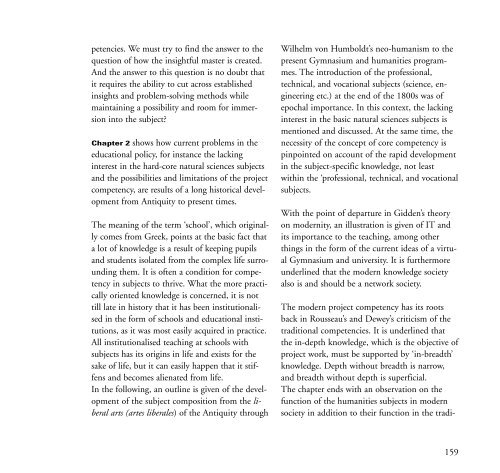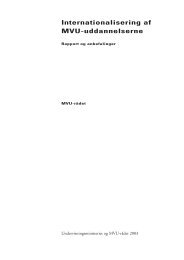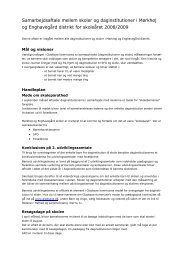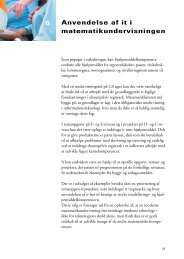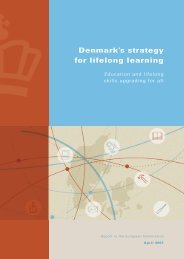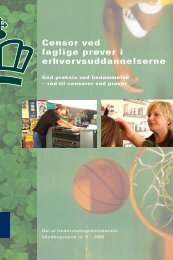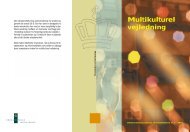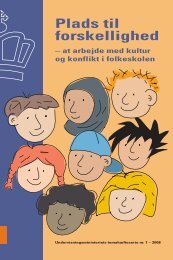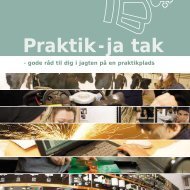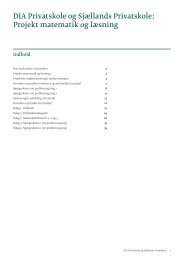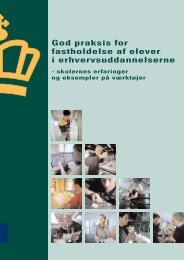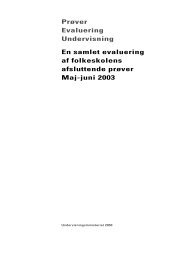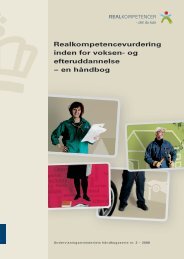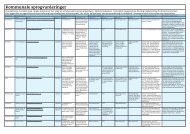Hele publikationen i printervenligt format - Ministeriet for Børn ...
Hele publikationen i printervenligt format - Ministeriet for Børn ...
Hele publikationen i printervenligt format - Ministeriet for Børn ...
Create successful ePaper yourself
Turn your PDF publications into a flip-book with our unique Google optimized e-Paper software.
petencies. We must try to find the answer to the<br />
question of how the insightful master is created.<br />
And the answer to this question is no doubt that<br />
it requires the ability to cut across established<br />
insights and problem-solving methods while<br />
maintaining a possibility and room <strong>for</strong> immersion<br />
into the subject?<br />
Chapter 2 shows how current problems in the<br />
educational policy, <strong>for</strong> instance the lacking<br />
interest in the hard-core natural sciences subjects<br />
and the possibilities and limitations of the project<br />
competency, are results of a long historical development<br />
from Antiquity to present times.<br />
The meaning of the term ‘school’, which originally<br />
comes from Greek, points at the basic fact that<br />
a lot of knowledge is a result of keeping pupils<br />
and students isolated from the complex life surrounding<br />
them. It is often a condition <strong>for</strong> competency<br />
in subjects to thrive. What the more practically<br />
oriented knowledge is concerned, it is not<br />
till late in history that it has been institutionalised<br />
in the <strong>for</strong>m of schools and educational institutions,<br />
as it was most easily acquired in practice.<br />
All institutionalised teaching at schools with<br />
subjects has its origins in life and exists <strong>for</strong> the<br />
sake of life, but it can easily happen that it stiffens<br />
and becomes alienated from life.<br />
In the following, an outline is given of the development<br />
of the subject composition from the liberal<br />
arts (artes liberales) of the Antiquity through<br />
Wilhelm von Humboldt’s neo-humanism to the<br />
present Gymnasium and humanities programmes.<br />
The introduction of the professional,<br />
technical, and vocational subjects (science, engineering<br />
etc.) at the end of the 1800s was of<br />
epochal importance. In this context, the lacking<br />
interest in the basic natural sciences subjects is<br />
mentioned and discussed. At the same time, the<br />
necessity of the concept of core competency is<br />
pinpointed on account of the rapid development<br />
in the subject-specific knowledge, not least<br />
within the ‘professional, technical, and vocational<br />
subjects.<br />
With the point of departure in Gidden’s theory<br />
on modernity, an illustration is given of IT and<br />
its importance to the teaching, among other<br />
things in the <strong>for</strong>m of the current ideas of a virtual<br />
Gymnasium and university. It is furthermore<br />
underlined that the modern knowledge society<br />
also is and should be a network society.<br />
The modern project competency has its roots<br />
back in Rousseau’s and Dewey’s criticism of the<br />
traditional competencies. It is underlined that<br />
the in-depth knowledge, which is the objective of<br />
project work, must be supported by ‘in-breadth’<br />
knowledge. Depth without breadth is narrow,<br />
and breadth without depth is superficial.<br />
The chapter ends with an observation on the<br />
function of the humanities subjects in modern<br />
society in addition to their function in the tradi-<br />
159


